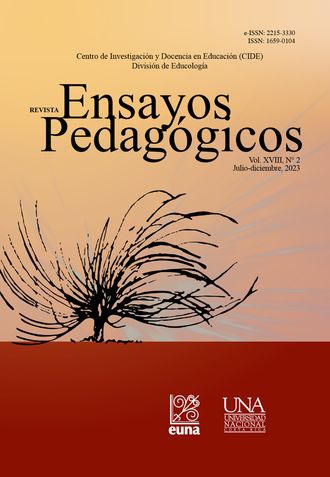Purple Glasses to Curb Inequalities through Pedagogy: A Proposal to Guide the Incorporation of Gender Theory Amongst the Pedagogical Courses of the Shared Majors of the Department of Educology of Universidad Nacional
DOI:
https://doi.org/10.15359/rep.18-2.7Keywords:
education, interseccionality, educational practice, gender theory, proposalAbstract
This essay intends to provide specific recommendations aiming at the crystallization of the transversality of gender theory amongst the pedagogical courses of the common majors of the Department of Educology of Universidad Nacional (UNA). To achieve that, the axes and thematic contents of the following courses are revised: Teacher Development and Professional Career Scenarios, Costa Rican Development and Educational Models, Human Development and Learning Theories, Seminar on Pedagogical Education: Pedagogy and Educational Processes, Introduction to Educational Processes, and Pedagogical Mediation for Inclusive Education. A series of recommendations are suggested to modify the syllabi of those courses, achieving that those students enrolled in Education with Specialization on Secondary Education are given a teaching process which enables them to analyze their educational practice from gender and intersectionality. It was opted for micro-breaks where the teaching staff does not need to have extensive training in gender to understand and apply the suggested elements, but only social sensitivity and a desire to transform the environment for a more just and egalitarian one. As the next thematic axis, it is urged to continue proposing recommendations such as these in other academic units in order to broaden the mainstreaming of this theory throughout the academic offerings of UNA.
References
Amnistía Internacional. (2021). Iceberg-violencia-género-default. https://blogs.es.amnesty.org/madrid/2021/03/01/niunamas-como-karla/iceberg-violencia-genero-default/
Araya, S. (2015). La categoría analítica del género: notas para un debate. Hallazgos, 12(23), 287-305. https://www.redalyc.org/pdf/4138/413838649014.pdf
Asamblea Universitaria. (2015). Estatuto Orgánico de la Universidad Nacional. https://documentos.una.ac.cr/bitstream/handle/unadocs/6693/ESTATUTO-ORG%C3%81NICO-UNA-digital.pdf
Barra, P. y Núñez, B. (2021). Una aproximación a la pedagogía feminista y sus prácticas en la educación rururbana [Tesis para optar por el grado de Licenciatura en Psicología, Universidad Academia de Humanismo Cristiano]. Biblioteca Digital UAHC. https://bibliotecadigital.academia.cl/xmlui/handle/123456789/6137
Calderón, P. (2009). Teoría de conflictos de Johan Galtung. Revista de Paz y Conflictos, 2, 60-81. https://www.redalyc.org/pdf/2050/205016389005.pdf
Chaves, R. (2015). Aspectos relevantes para la transversalización de la perspectiva de género en el proceso de desarrollo curricular universitario. Revista Espiga, 29, 33-43. https://www.redalyc.org/pdf/4678/467846262004.pdf
Delvó, P., Fernández, D. y Jiménez, S. (2021). Segundo Diagnóstico Institucional: Relaciones de Equidad entre Mujeres y Hombres en la Universidad Nacional. https://www.iem.una.ac.cr/index.php/quienes-somos/documentos/category/26-libros-iem?download=83:segundo-diagnostico-institucional
Freire, P. (1994). Pedagogía del oprimido (45.ta ed.). Siglo XXI. https://www.servicioskoinonia.org/biblioteca/general/FreirePedagogiadelOprimido.pdf
Freire, P. (2004). Pedagogía de la autonomía (2.a ed.). Paz e Terra. https://redclade.org/wp-content/uploads/Pedagog%C3%ADa-de-la-Autonom%C3%ADa.pdf
Grosfoguel, R. (2013). Racismo/sexismo epistémico, universidades occidentalizadas y los cuatro genocidios/epistemicidios del largo siglo XVI. Tabula Rasa, 19, 31-58. https://dialnet.unirioja.es/servlet/articulo?codigo=8361360
Hernández, Y. (2006). Acerca del género como categoría analítica. Nómadas. Critical Journal of Social and Juridical Sciences, 13(1), 1-11. https://www.redalyc.org/pdf/181/18153296009.pdf
Hernández, M. L., Hernández, K. y Vargas, I. (2015a). Representaciones sociales en adultas trans que incursionaron en la explotación sexual comercial siendo menores de edad [Tesis para optar por el grado de Licenciatura en Psicología, Universidad Católica de Costa Rica]. SSBUCAT. https://opac.ucatolica.ac.cr/cgi-bin/koha/opac-detail.pl?biblionumber=2817
Hernández, M. L., Hernández, K. y Vargas, I. (2015b, 22 de junio). TRANS-formando [video]. YouTube. https://www.youtube.com/watch?v=aUG-Li6w5C8
Instituto de Políticas Públicas en Derechos Humanos (IPPDH). (2022). 17 de mayo – Día Internacional contra la Homofobia, la Bifobia y la Transfobia. https://www.ippdh.mercosur.int/17-de-mayo-dia-internacional-contra-la-homofobia-la-bifobia-y-la-transfobia-2/#:~:text=El%2017%20de%20mayo%20de,natural%20de%20la%20sexualidad%20humana
Instituto Nacional de Estadística y Censos de Costa Rica (INEC). (2017). Encuesta Nacional de Uso del Tiempo. https://inec.cr/multimedia/enut-2017-encuesta-nacional-uso-del-tiempo-0
Instituto Nacional de Estadística y Censos de Costa Rica (INEC). (2022). Esperanza de vida al nacer. https://inec.cr/indicadores/esperanza-vida-al-nacer
Martínez, I. (2016). Construcción de una pedagogía feminista para una ciudadanía transformadora y contrahegemónica. Foro de Educación, 14(20), 129-151. https://www.redalyc.org/pdf/4475/447544536008.pdf
Mora, A. (2019, 15 de octubre). Datos del INAMU y BCCR ponen el foco en la importancia del trabajo doméstico no remunerado. Delfino. https://delfino.cr/2019/10/datos-del-inamu-y-bccr-ponen-el-foco-en-la-importancia-del-trabajo-domestico-no-remunerado
ONU Mujeres. (2018). Hacer las promesas realidad: La igualdad de género en la Agenda 2030 para el desarrollo sostenible (1.a ed.). ONU Mujeres. https://www.unwomen.org/sites/default/files/Headquarters/Attachments/Sections/Library/Publications/2018/SDG-report-Gender-equality-in-the-2030-Agenda-for-Sustainable-Development-2018-es.pdf
Organización de los Estados Americanos (OEA). (2015). Comunicado de prensa: En el Día Internacional de la Memoria Trans, CIDH urge a los Estados a aumentar la expectativa de vida de las personas trans en América. https://www.oas.org/es/cidh/prensa/comunicados/2015/137.asp
Organización Mundial de la Salud (OMS). (1990). 43a Asamblea Mundial de la Salud. Ginebra, 7-17 de mayo de 1990. Resoluciones y decisiones. Anexos. https://iris.who.int/bitstream/handle/10665/201722/WHA43_1990-REC-1_spa.pdf?isAllowed=y&sequence=1
Organización de las Naciones Unidas (ONU). (1948). Declaración Universal de los Derechos Humanos. https://www.un.org/es/about-us/universal-declaration-of-human-rights#:~:text=Elaborada%20por%20representantes%20de%20todas,todos%20los%20pueblos%20y%20naciones
Organización de las Naciones Unidas (ONU). (2015). La Asamblea General adopta la Agenda 2030 para el Desarrollo Sostenible. https://www.un.org/sustainabledevelopment/es/2015/09/la-asamblea-general-adopta-la-agenda-2030-para-el-desarrollo-sostenible/
Ramírez, J. (2018). El racismo entra y sale de la escuela (1.a ed.). EUNA. https://www.euna.una.ac.cr/index.php/EUNA/catalog/book/229
Rodríguez, V. (2021, setiembre). Mujeres en la bibliografía [video]. Charla TED. https://www.ted.com/talks/valeria_rodriguez_quesada_mujeres_en_la_bibliografia
Ulate, C. y Preinfalk, M. L. (eds.) (2016). Política para la igualdad y equidad de género en la Universidad Nacional y Plan de acción (2.a ed.). Instituto de Estudios de la Mujer. https://www.escinf.una.ac.cr/index.php/documentos/normativa-general?download=74:politicas-de-igualdad-y-equidad-de-genero-una
Williams-Crenshaw, K. (2016, octubre). La urgencia de la interseccionalidad [video]. Charla TED. https://www.ted.com/talks/kimberle_crenshaw_the_urgency_of_intersectionality?language=es
Published
How to Cite
Issue
Section
License
Copyright (c) 2024 Ensayos Pedagógicos Journal

This work is licensed under a Creative Commons Attribution-NonCommercial-NoDerivatives 4.0 International License.
Ensayos Pedagógicos is subscribed to the Attribution-NonCommertial-NoDerivatives 4.0 International Creative Commons Licence, which allows both authors and readers to freely download, store, copy, and distribute the final approved publisehd version of the manuscript (post-print) as long as this is done without commercial purposes, no derivative works are generated, and the source and author are mentioned. As well, Ensayos Pedagógicos declares that authors will remain the rightful owners of the copyrights of their work in perpetuity.







